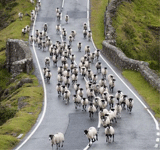| Famous Panda to Celebrate 35th Birthday | |||||||||||
|
|||||||||||
//english.dbw.cn 2015-11-27 13:56:34 |
|||||||||||
 Giant panda Basi eats bamboo leaves at the panda research and exchange center in Fuzhou, capital of southeast China's Fujian Province, Sept. 25, 2015. Basi will turns 35 in November, making her over 100 in human years. The panda research and exchange center in Fuzhou want to invite 50 VIPP (very important panda people), including the American breeders and members of the public that the centenarian panda met during her performance tour in San Diego in 1987. Basi is possibly the most famous panda in China. In 1990, she was chosen as the prototype for Pan Pan, the mascot for the Beijing Asian Games. [Photo: Xinhua] Basi, the panda who rose to fame as the mascot of the 11th Asian Games in Beijing, will celebrate her 35th birthday-the equivalent of more than 100 human years-on Saturday in Fuzhou, the capital of Fujian province. Fuzhou has been her home since 1985, one year after she was rescued from the wild. Among the gifts that Basi will receive from her human friends on the big day will be a cake, which will be easy for her to eat, since her teeth have rotted. "Basi is the second-oldest panda in the world," said Zhang Guiquan, a senior panda expert from the Wolong National Nature Reserve in Wenchuan county, Sichuan province. "Jia Jia, a 38-year-old female panda at Ocean Park Hong Kong, is the oldest. A captive panda normally lives for 30 years." One year for a panda is equivalent to three or four years for a human being, Zhang added. Basi, born in the Basi valley of Baoxing county in Sichuan province in 1980, was saved by a villager from an icy river in 1984 as she fled a pursuing hyena. She was starving at the time, as that year bamboo, the staple food of pandas, was just blossoming. The villager, Li Xingyu, named her Basi, which means "nice" in the Sichuan dialect. After first living in the Fengtongzhai Nature Reserve in Sichuan, Basi was sent to the Fuzhou Giant Panda Research Center in Fujian. At the Fuzhou center, she was trained to ride a bicycle, shoot a basket with a basketball and lift weights. In 1987, she stayed for half a year in the United States in San Diego, where her stunts fascinated countless visitors. In 1990, Basi became a household name in China when she was the mascot of the 11th Asian Games in Beijing. Basi has a den to herself in the Fuzhou panda research center. Due to aging, she becomes breathless after taking a few steps. Since she can no longer gnaw, her keepers feed her crushed bamboo leaves. They also feed her mashed apples and radishes to keep her healthy.
|
|||||||||||
| Author: Source:CRI Editor:Yang Fan |
|||||||||||
 中文简体
中文简体










